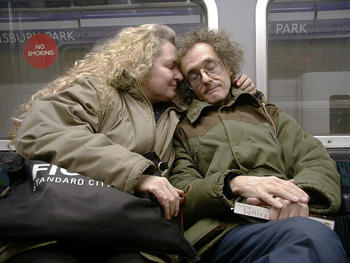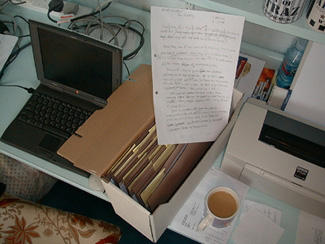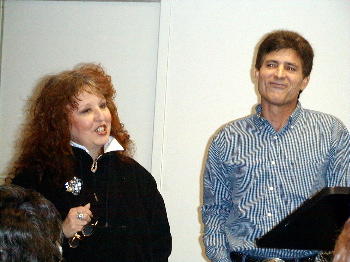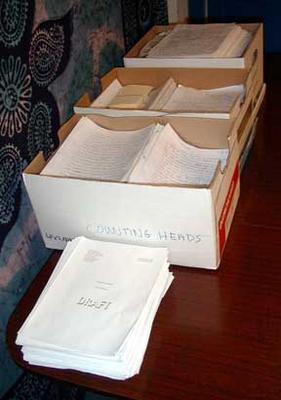

And here's what the manuscript looked like four months in. The page on top is what was then the first page.
Although most everything on the page has changed, I am amazed reading it now to see my major themes and characters laid out. Also, as you can see, I write in longhand. (I know. I know; it's crazy)
When I say it took me five years to write this book, I am talking about what is in effect a half-time job, for I spent about four hours a day, six days a week on it. During that time I eschewed writing short stories or anything else. By January 2003, I was four years into it. I was finishing up Draft 4 and was wintering over in Denton, Texas, with my friends Rusty and Avis Ruffu pictured here.

I sent Draft 4 to my agents. Suddenly I didn't have anything to write. I had been saving story ideas in notebooks and thought I could dash off a few short stories while I waited, and I did, indeed, draft a few (only one of which got sent out and sold ("Listen to Me," Asimov's, June 2003). Turns out I like the daily routine of novel writing and I had another one I wanted to do. It was called PLANET S, and I spent almost a year bringing it to Draft 3.

But then on January 21, 2004, thirteen months after finishing COUNTING HEADS and five years almost to the day after starting it, I got word from my agent that David Hartwell, senior editor at Tor, had decided to buy it. You can imagine my excitement. My long slog was through, and I could bask in the glory of becoming a published novelist, joining my literary heroes, or so I thought. Here's the manuscript and all its revisions when I sold it.
But I wasn't finished. My editor had bought it with the proviso that I cut it into two books. It was about 185,000 words, which I was told is too long (too costly, risky) for a first-time, unknown like me. Of course I agreed; I would have agreed to body piercing to make the sale. Plus, it meant I would have TWO books coming out in rapid succession. I was given about three months to break the book in a convenient spot. I had to rewrite quite a bit and add scenes to pull it off. I even gave a major character a personality change.
This was a useful experience for me because I was forced to concentrate on plot and pacing. Pacing had been a nightmare for me with the longer ms. but with 110K words I found I could get a handle on it. I saw a vast improvement with the new, shorter version. I sent it off to my editor and spent the next few months working on Book 2, the latter part of the original plus a lot of new material.
Imagine my surprise last summer when my editor got back to me with the news that Book 1 wasn't enough by itself. I freaked. He said he wanted me to put the two books back together. I didn't want to. We had a meeting at the Worldcon in Boston and over a two-hour breakfast, he convinced me. I still had a concern--Draft 4 had been 185k words. I added scenes to Draft 5 and changed the story enough that the old second half wouldn't fit anymore without revision. Was he going to require me to lose about 50k words in order to fit into the financial constraints of publishing? He promised me he wouldn't.
So, I started on Draft 6, the remelding. Fortunately, the new stuff I had been drafting for Book 2 came in handy. In fact, IMO it was some of the best stuff I had. The remelding took about three months, and I turned in the final ms. in January of this year, six years after starting.
My editor kept his word, and when the final ms. (now around 180k) exceeded allowable length, he gave me the option of not cutting (about 80 pages) and instead setting the type more compactly. This is why the words on the page may strike some (those of us with bifocals) as rather dense. But that's OK, because the prose is dense too, so it's a package deal. Besides, think of the trees we saved.
The aftermath. I turned in the final ms. on Jan. 4, 2005, and the next day I got the worst case of writer's block in my life. Over the next weeks and months, I tried writing short stories. I tried restarting PLANET S. I even tried writing a poem or two (!!) I was diligent in my routine, sitting down every morning and picking up my pencil, but nothing came out. Frustrating, demoralizing. Of course I realized it was probably temporary, just a case of my imagination shifting gears, that I should probably pamper myself, do research, read, take a vacation, have fun. Couldn't quite convince myself of that, though, couldn't quite write either. Fortunately, a friend helped me see my way out of writer's limbo. (Thank you, C) And now I'm back on my half-time routine, happily pecking away at a whole new COUNTING HEADS Book 2. I have grown very fond of my characters and I feel I know their world so well, I'd like to put out another couple or so novels in the same universe. My overarching plot, in fact, demands it.
4 comments:
I always liked that photo of me and Chris.:)
oh, but what is the way out of writers limbo?
Pat--
It's my favorite of you guys too, or at least my favorite work-safe one.
Robin--
Darn it; I knew I shouldn't have used the word limbo. Let's just say that ritual offerings to certain pagan gods was involved.
Post a Comment